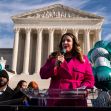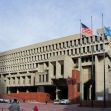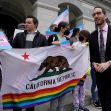A 65-year-old hot dog vendor was attacked during a Pride event on Sunday, June 25 around 11 p.m. at Washington Square Park in Greenwich Village. Police say that the attack started because of a disagreement in prices, but onlookers who caught the attack on tape say it started because the hot dog vendor used an anti-gay slur against someone in the LGBTQ+ community. The vendor’s face was bloodied and he was sent to Bellevue Hospital to treat cuts on his head.
In the park earlier that night, there had been an altercation between Pride Parade-goers and police. The police used pepper spray to disperse the crowd around 7:15 p.m. Eight people were arrested in the scuffle. Two of the people arrested were Emily Hagen, 23, and Joanis Arthuer, 20, who were allegedly throwing bottles at police.
According to Fox News, Hagen was charged “with three counts of assault, resisting arrests, obstructing governmental administration and criminal possession of a weapon.”
Arthuer was charged “with two counts of assault, obstruction of governmental administration and criminal possession of a weapon,” according to Fox News.
The vendors say that they were attacked by people celebrating Pride for flying the American flag instead of a Pride flag. “They said, ‘Take that f—ing flag down. Why don’t you put up my flag?’” Abdo Mansour, the hot dog vendor, said. “And they broke my American flag.”
According to The First Amendment Encyclopedia, “hate speech,” which is defined as “abusive language specifically attacking a person or persons because of their race, color, religion, ethnic group, gender, or sexual orientation,” is for the most part protected by the First Amendment.
“Fighting words” are “those words without social value, directed to a specific individual, that would provoke a reasonable member of the group about whom the words are spoken,” according to Lindved Press Blog and Publisher (PBP). This type of speech is not protected by the First Amendment.
In the case of Wisconsin v. Mitchell, 508 U.S. 476 (1993), Mitchell and some black youths were standing outside a movie theater after going to see Mississippi Burning, where several black people are beaten. A white boy happened to walk by them and Mitchell said, “There goes a white boy; go get him!” Mitchell and the others beat up the white boy.
In Wisconsin, if you are charged with battery, the penalty can be increased if the person selected their victim “because of the race, religion, color, disability, sexual orientation and national origin or ancestry of that person.” In Wisconsin v. Mitchell, the Supreme Court ruled that this increase in the penalty did not deprive a person of their First Amendment rights. The Supreme Court said that the increased penalty was due to Mitchell targeting a particular person, not because of his thoughts.
In the case of the hot dog vendor, if the hot dog vendor did say an anti-gay slur to someone in a crowd celebrating Pride that was already acting pretty rowdy, then he would know that the person would likely react negatively and possibly violently. Therefore, the vendor’s slur would be considered “hate speech” and would not be protected by the First Amendment since he is specifically targeting someone that he knows is a part of the LGBTQ+ community. However, if the vendor was peacefully selling hot dogs and the crowd was mad at him over displaying an American flag instead of a Pride flag and broke his flag, then the vendor would not be at fault since he was peacefully displaying his American flag.
The limits of what speech is protected by the First Amendment and what speech is not protected has been and will always be a difficult balancing act.






